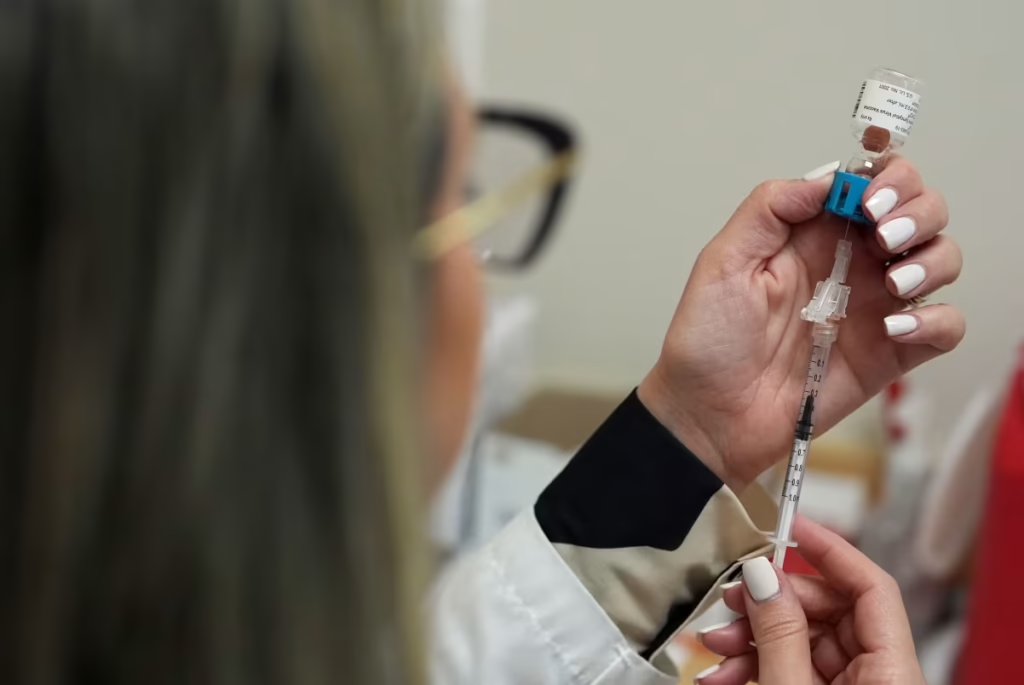As the leaves turn golden and the air carries a familiar chill, Americans are being reminded that flu, COVID-19, and respiratory syncytial virus (RSV) season is here. The U.S. Centers for Disease Control and Prevention (CDC) predicts that hospitalizations due to these viruses in the 2025-26 season could be similar to last year’s peak numbers. While infection is not guaranteed to be prevented entirely, vaccination remains the most effective tool to reduce severe illness and hospitalization.
“One of the most common questions I get from patients is, ‘I got the flu shot last year, or I got the COVID vaccine, but I still got sick. What gives?’” said Dr. Mike Ren, assistant professor of family and community medicine at Baylor College of Medicine. “Vaccines may not prevent every infection, but they dramatically reduce the severity of disease. The goal is to prevent severe illness, hospitalizations, or worse.”
CDC estimates indicate nearly 1 million flu-related hospitalizations and up to 130,000 flu deaths in the 2024-25 season. COVID-19 hospitalizations reached around 540,000, with about 63,000 deaths over the same period.
COVID-19 Vaccines:
For the 2025-26 season, COVID-19 vaccines are available to everyone aged 6 months and older, including pregnant individuals. Unlike previous years, the CDC is not issuing an explicit booster recommendation this fall. Instead, the agency encourages a “shared-decision making” approach, meaning individuals should consult with healthcare providers to discuss risks and benefits. Healthcare providers may include doctors, pharmacists, nurse practitioners, and physician assistants.
Three vaccines are available in the U.S.: Pfizer (ages 5+), Moderna (6 months+), and Novavax (12+). Pfizer and Moderna use mRNA technology, while Novavax is a protein-based vaccine. Updated vaccines target the latest circulating strains and are widely available at pharmacies, doctor’s offices, and public health departments. CVS and Walgreens are among the major pharmacy chains offering the updated vaccines nationwide, and prescriptions from outside providers are no longer required.
Experts recommend getting vaccinated in October or early November to ensure protection through the holiday season. If someone has recently recovered from COVID-19, it is advised to delay the booster, as recent infection provides some natural immunity. Insurance typically covers the cost, but for uninsured individuals, the retail price may be around $220.
Effectiveness data from last year show that updated COVID-19 vaccines provided about 39% protection against hospitalization and approximately 64% protection against death. COVID-19 vaccines can be safely administered alongside the seasonal flu shot if desired, though mild fatigue or soreness may be slightly more noticeable when receiving multiple vaccines at once.
Flu Vaccines:
The CDC recommends annual flu vaccination for everyone aged 6 months and older. Most individuals need just one dose per season, while children receiving the vaccine for the first time require two doses spaced four weeks apart. Effectiveness of the flu vaccine varies each year; last season, it was estimated between 42% and 56% in adults.
Flu vaccines are best administered at least two weeks before Thanksgiving to allow time for immunity to develop. September and October are generally considered ideal months for vaccination. The vaccine is available at local pharmacies, doctor’s offices, and some public health departments.
This year, FluMist, the nasal spray flu vaccine, is available for at-home administration in 34 states for children as young as 2 (with parental supervision) and adults under 50. The at-home option includes a brief medical screening and review by a licensed healthcare provider before dispensing. Retail prices range from $30 for a regular dose to $130 for high-dose formulations, often recommended for adults over 65. FluMist at-home delivery is typically covered by insurance, with a small $8.99 shipping fee.
RSV Vaccines:
RSV vaccination is recommended for adults 75 and older, as well as adults 50-74 who are at increased risk of severe illness. One dose usually provides protection for at least two years. For infants, RSV antibodies can be administered after birth, while pregnant individuals may receive the vaccine between 32 and 36 weeks to pass antibodies to their newborn. Vaccinations for mothers are generally available from September through January, while infant antibody shots are recommended from October through March. Insurance may cover the cost, though out-of-pocket expenses can reach $350.
Additional Preventive Measures:
Vaccination is not the only defense against respiratory illnesses. Experts advise basic hygiene practices such as frequent handwashing, using hand sanitizer, and covering coughs or sneezes. Avoiding crowded indoor spaces and wearing masks when appropriate can further reduce risk. Pneumococcal vaccines are recommended for certain adults and children to prevent bacterial infections like pneumonia.
A healthy lifestyle also supports immunity. Adequate sleep, a balanced diet rich in fruits and vegetables, and taking multivitamins can help the body fight infections. “Flu, COVID-19, and RSV are transmitted through respiratory droplets and contaminated surfaces,” Dr. Ren noted. “Even touching a door handle or grocery item after someone with a virus has touched it can spread infection.”
Timing Matters:
Experts recommend planning vaccinations ahead of the peak season. For COVID-19 and flu, October through early November is ideal. RSV vaccines should be administered in late summer or early fall for adults, and during the recommended windows for pregnant individuals and infants.
While vaccines may not eliminate the risk entirely, they remain the most effective method for preventing severe illness, hospitalizations, and death. Combined with hygiene measures, masking, and healthy lifestyle habits, Americans can significantly reduce the impact of respiratory illnesses this season.
Conclusion:
As the 2025-26 respiratory virus season approaches, public health experts urge Americans to act proactively. Vaccination against COVID-19, flu, and RSV, along with proper hygiene and lifestyle practices, offers the best protection. With updated vaccines widely available and guidance from healthcare providers, taking these steps now can help ensure a safer and healthier fall and winter.

